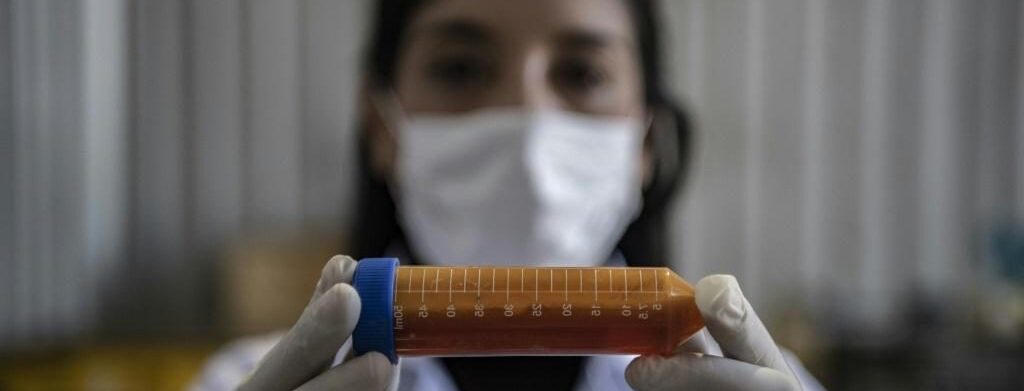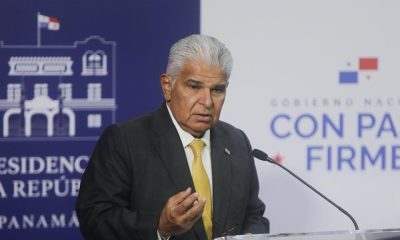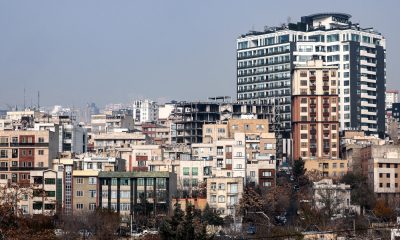International
Chilean scientist plans to clean up mining with ‘metal eating’ bacteria

AFP
Starving microorganisms capable of surviving in extreme conditions have already managed to “eat” a nail in just three days.
In Chile, a scientist is testing “metal-eating” bacteria she hopes could help clean up the country’s highly-polluting mining industry.
In her laboratory in Antofagasta, an industrial town 1,100-kilometers north of Santiago, 33-year-old biotechnologist Nadac Reales has been carrying out tests with extremophiles — organisms that live in extreme environments.
Reales came up with her idea while still at university as she was conducting tests at a mining plant using microorganisms to improve the extraction of copper.
“I realized there were various needs in the mining industry, for example what happened with the metallic waste,” she told AFP.
Some metals can be recycled in smelting plants but others, such as HGV truck hoppers that can hold 50 tons of rock, cannot and are often discarded in Chile’s Atacama desert, home to the majority of the country’s mining industry.
Chile is the world’s largest producer of copper, which accounts for up to 15 percent of the country’s GDP, resulting in a lot of mining waste that pollutes the environment.
In her research, Reales, who now runs her own company Rudanac Biotec, concentrated on iron-oxidizing bacteria called Leptospirillum.
She extracted the bacteria from the Tatio geysers located 4,200 meters above sea level, some 350 kilometers from Antofagasta.
The bacteria “live in an acidic environment that is practically unaffected by relatively high concentrations of most metals,” she said.
“At first the bacteria took two months to disintegrate a nail.”
But when starved, they had to adapt and find a way of feeding themselves.
After two years of trials, the result was a marked increase in the speed at which the bacteria “ate,” devouring a nail in just three days.
– Surprising benefit –
Reales says “chemical and microbiological tests” have proved the bacteria are not harmful to humans or the environment.
“We’ve always seen a lot of potential in this project that has already passed an important test in the laboratory,” said Drina Vejar, a microbiologist who is part of a four-person team working with Reales.
“It’s really necessary at this time when we have to plan for a more sustainable development, especially in all these cities with so many polluting industries.”
Mining companies have shown interest in the research but while Rudanac Biotec previously benefitted from a state fund for start-ups, the company needs investment to move on to its next stage of trials.
Reales says she needs money to see if her method will “eat a medium sized beam or a hopper.”
When the disintegration process is complete, what remains is a reddish liquid residue, a solution known as a lixiviant that itself possesses a surprising quality.
“After biodisintegration the product generated (the liquid) can improve the recovery of copper in a process called hydrometallurgy,” said Reales.
Essentially, the liquid residue can be used to extract copper from rock in a more sustainable manner than the current use of chemicals in leaching.
Reales says it means green mining is “totally feasible.”
That is of great interest to mining companies that could use it to improve their large scale extraction of copper or other minerals, while also reducing their pollution, something they are required to do by law.
Reales recently submitted a request for an international patent for her technology, but more importantly she hopes it will help reduce metal waste blotting the landscape in the mining regions of her country.
International
Mexico’s president blasts ‘Inhumane’ U.S. migration law

Mexican President Claudia Sheinbaum stated on Friday that any Mexican detained in the United States should be “immediately” returned to Mexico. Her remarks come in the wake of the opening of a new migrant detention center in Florida earlier this week.
Speaking during her daily press conference, known as La Mañanera del Pueblo, Sheinbaum emphasized that so far, no Mexican national has been held in the facility, which has already sparked controversy and has been nicknamed “the Alcatraz of the Alligators.”
She also criticized the new fiscal law signed by former U.S. President Donald Trump, passed by Congress just a day earlier. The law, which Trump dubbed the “great and beautiful tax reform,” includes significant tax cuts and sweeping reductions in public policies, reallocating billions toward national security and defense—including $170 billion to enhance border security, deportations, and the expansion of detention centers.
“We do not agree with a punitive approach to migration. Migration must be addressed through its structural causes, with cooperation for development,” Sheinbaum asserted.
The Mexican president labeled the Trump administration’s view of migrants as criminals as “inhumane,” and warned that such policies ultimately harm the U.S. economy. She pointed to the mass deportation of agricultural workers as an example of how these actions are already backfiring.
“These are hardworking people—people of good will—who contribute more to the U.S. economy than they do to Mexico’s,” Sheinbaum said, announcing that her government will strengthen support programs to ensure that affected migrants can return home safely and reintegrate into the workforce.
International
Julio César Chávez Jr. faces charges in Mexico after U.S. arrest

Mexican President Claudia Sheinbaum announced on Friday that the country is expecting the deportation of boxer Julio César Chávez Jr. so he can face legal proceedings in Mexico, following his arrest in the United States and confirmation by Mexico’s Attorney General’s Office (FGR) of an arrest warrant for organized crime and arms trafficking.
“This is an arrest warrant stemming from an investigation that began in 2019 and was granted by a judge in 2023 (…). We are expecting his deportation so he can serve his sentence in Mexico,” Sheinbaum stated during her daily press briefing.
The president said she was unaware of the case until speaking with Attorney General Alejandro Gertz Manero, who confirmed an investigation linked to organized crime. She also noted that authorities had been unable to execute the warrant earlier because Chávez Jr. had spent most of his time in the United States. “His deportation to Mexico is now being pursued,” she added.
Sheinbaum said there is no confirmed date yet for the boxer’s return to the country, as the process involves “specific protocols” that the FGR is currently handling.
Her statement follows the announcement by U.S. authorities on Thursday of Chávez Jr.’s arrest. The boxer, son of Mexican boxing legend Julio César Chávez, is accused of involvement in organized crime and arms trafficking allegedly tied to the Sinaloa Cartel.
“This Sinaloa Cartel affiliate, wanted for trafficking firearms, ammunition, and explosives, was arrested by U.S. Immigration and Customs Enforcement (ICE),” said Tricia McLaughlin, Deputy Assistant Secretary at the Department of Homeland Security (DHS), in an official statement.
International
Europe faces a summer of heatwaves and wildfires, Red Cross warns

The heatwave sweeping across Europe — accompanied by wildfires in countries such as Greece and Turkey — is “just the beginning” of a summer season expected to see extreme conditions lasting through September, the International Federation of Red Cross and Red Crescent Societies (IFRC) warned.
In a statement, the IFRC stressed the urgent need for governments and communities to shift from a reactive to a preventive approach to safeguard lives.
The organization reported that wildfires in the Turkish region of Izmir, on the country’s western coast, have already claimed at least two lives and forced the evacuation of 50,000 people. Meanwhile, on the Greek island of Crete, around 5,000 residents and tourists have also had to flee due to encroaching fires.
Smaller-scale evacuations and wildfires are also being reported in other countries, including eastern Germany and North Macedonia, with Red Cross volunteers actively involved in firefighting and relief operations.
“Heatwaves and wildfires — increasingly frequent and deadly — are no longer isolated events. They are becoming the new reality for millions,” said Birgitte Bischoff, IFRC’s Regional Director for Europe.
-

 Central America4 days ago
Central America4 days agoPanama’s President Mulino: “We are regaining international trust” to exit tax haven lists
-

 International2 days ago
International2 days agoJulio César Chávez Jr. faces charges in Mexico after U.S. arrest
-

 International3 days ago
International3 days agoTehran airports resume operations as Iran lifts airspace closure
-

 International2 days ago
International2 days agoMexico’s president blasts ‘Inhumane’ U.S. migration law
-

 International4 days ago
International4 days agoTrump to decide soon on deportation exemptions for construction and farm workers
-

 International4 days ago
International4 days agoIDB plans $11 billion in sustainable financing to support countries facing currency risks
-

 International2 days ago
International2 days agoDenmark takes Trump’s Greenland threats seriously, rules out military annexation
-

 International2 days ago
International2 days agoEurope faces a summer of heatwaves and wildfires, Red Cross warns
-

 International4 days ago
International4 days agoMaduro’s government appeals to Vatican for help rescuing migrant children
-

 International3 days ago
International3 days agoMan attacks passengers with axe on german ICE Train
-

 International4 days ago
International4 days agoFormer argentine president seeks brazilian leader’s visit amid house arrest




















